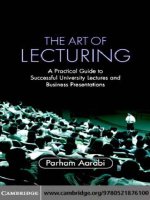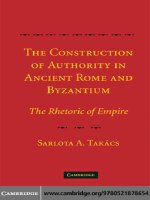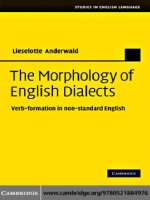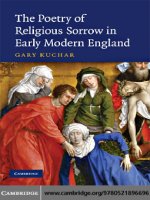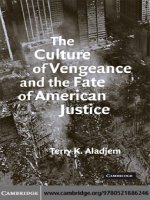0521844665 cambridge university press hegels critique of metaphysics jun 2007
Bạn đang xem bản rút gọn của tài liệu. Xem và tải ngay bản đầy đủ của tài liệu tại đây (922.93 KB, 270 trang )
This page intentionally left blank
H E G E L’ S C R I T I Q U E O F M E TA P H Y S I C S
Hegel’s Science of Logic has received less attention than his Phenomenology
of Spirit, but Hegel himself took it to be his highest philosophical achievement and the backbone of his system. The present book focuses on this
most difficult of Hegel’s published works. B´eatrice Longuenesse offers a
close analysis of core issues, including discussions of what Hegel means
by “dialectical logic,” the role and meaning of “contradiction” in Hegel’s
philosophy, and Hegel’s justification for the provocative statement that
“what is rational is actual, what is actual is rational.” She examines both
Hegel’s debt and his polemical reaction to Kant, and shows in great detail
how his project of a “dialectical” logic can be understood only in light of
its relation to Kant’s “transcendental” logic. This book will appeal to anyone interested in Hegel’s philosophy and its influence on contemporary
philosophical discussion.
b e´ at r i c e l o n g u e n e s s e is Professor of Philosophy at New York
University. She is author of Kant on the Human Standpoint (2005).
MODERN EUROPEAN PHILOSOPHY
General Editor
ROBERT B. PIPPIN, University of Chicago
Advisory Board
GARY GUTTING, University of Notre Dame
ROLF-PETER HORSTMANN, Humboldt University, Berlin
MARK SACKS, University of Essex
Some recent titles
Daniel W. Conway: Nietzsche’s Dangerous Game
John P. McCormick: Carl Schmitt’s Critique of Liberalism
Frederick A. Olafson: Heidegger and the Ground of Ethics
G¨unter Z¨oller: Fichte’s Transcendental Philosophy
Warren Breckman: Marx, the Young Hegelians, and the Origins of Radical
Social Theory
William Blattner: Heidegger’s Temporal Idealism
Charles Griswold: Adam Smith and the Virtues of Enlightenment
Gary Gutting: Pragmatic Liberalism and the Critique of Modernity
Allen Wood: Kant’s Ethical Thought
Karl Ameriks: Kant and the Fate of Autonomy
Alfredo Ferrarin: Hegel and Aristotle
Cristina Lafont: Heidegger, Language, and World-Disclosure
Nicholas Wolsterstorff: Thomas Reid and the Story of Epistemology
Daniel Dahlstrom: Heidegger’s Concept of Truth
Michelle Grier: Kant’s Doctrine of Transcendental Illusion
Henry Allison: Kant’s Theory of Taste
Allen Speight: Hegel, Literature and the Problem of Agency
J. M. Bernstein: Adorno
Will Dudley: Hegel, Nietzsche and Philosophy
Taylor Carman: Heidegger’s Analytic
Douglas Moggach: The Philosophy and Politics of Bruno Bauer
Rudiger
¨
Bubner: The Innovations of Idealism
Jon Stewart: Kierkegaard’s Relations to Hegel Reconsidered
Michael Quante: Hegel’s Concept of Action
Wolfgang Detel: Foucault and Classical Antiquity
Robert M. Wallace: Hegel’s Philosophy of Reality, Freedom, and God
Johanna Oksala: Foucault on Freedom
B´eatrice Longuenesse: Kant on the Human Standpoint
Wayne M. Martin: Theories of Judgment
H E G E L’ S C R I T I Q U E O F
M E TA P H Y S I C S
B E´ AT R I C E L O N G U E N E S S E
New York University
translated by
NICOLE J. SIMEK
CAMBRIDGE UNIVERSITY PRESS
Cambridge, New York, Melbourne, Madrid, Cape Town, Singapore, São Paulo
Cambridge University Press
The Edinburgh Building, Cambridge CB2 8RU, UK
Published in the United States of America by Cambridge University Press, New York
www.cambridge.org
Information on this title: www.cambridge.org/9780521844666
© Originallypublished in French as Hegel et la Critique de la MetaphysiqueLibrairie
Philosophique J. Vrin, Paris, 1981
This publication is in copyright. Subject to statutory exception and to the provision of
relevant collective licensing agreements, no reproduction of any part may take place
without the written permission of Cambridge University Press.
First published in print format 2007
eBook (EBL)
ISBN-13 978-0-511-29470-9
ISBN-10 0-511-29470-0
eBook (EBL)
hardback
ISBN-13 978-0-521-84466-6
hardback
ISBN-10 0-521-84466-5
paperback
ISBN-13 978-0-521-60641-7
paperback
ISBN-10 0-521-60641-1
Cambridge University Press has no responsibility for the persistence or accuracy of urls
for external or third-party internet websites referred to in this publication, and does not
guarantee that any content on such websites is, or will remain, accurate or appropriate.
for Rolf-Peter Horstmann
CONTENTS
List of abbreviations
Note on citations
Preface
page x
xi
xiii
pa rt i h e g e l ’ s c r i t i q u e o f m e ta p h y s i c s :
a s t u dy o f t h e d o c t r i n e o f e s s e n c e
1
2
3
4
Introduction
Transcendental logic and dialectical logic: from Kant to
Hegel, a critique of all dogmatic metaphysics
Twists and turns of Hegel’s contradiction
Ground against concept ?
What is rational is actual, what is actual is rational
Conclusion
3
10
39
85
110
160
pa rt i i p o i n t o f v i e w o f m a n o r k n ow l e d g e
of god
5
6
Point of view of man or knowledge of God. Kant and Hegel
on concept, judgment, and reason
Hegel on Kant on judgment
Notes
Bibliography
Index
165
192
218
239
244
ix
A B B R E V I AT I O N S
Christianity
Diff.
E. L.
Faith
H. P.
L.
L. A.
Letters
Phen.
R.
The Spirit of Christianity and its Fate
The Difference between Fichte’s and Schelling’s System of
Philosophy
Encyclopedia Logic
Faith and Knowledge
Lectures on the History of Philosophy
Science of Logic
Lectures on Fine Arts [Aesthetics]
Hegel: the Letters
Phenomenology of Spirit
Principles of the Philosophy of Right
x
N O T E O N C I TAT I O N S
When I talk of “Hegel’s Logic” I primarily mean the logic expounded
in Hegel’s Science of Logic, published in 1812 and 1816. Its first part,
Objective Logic, is in two books: Book 1, Being (published in 1812,
with a second, revised edition in 1831); and Book 2, the Doctrine of
Essence (published in 1812). Its second part is the Subjective Logic
(published in 1816). See G. W. F. Hegel, Wissenschaft der Logik, in Gesammelte Werke, ed. Nordrhein-Westf¨alische Akademie der Wissenschaften
(Hamburg: Felix Meiner Verlag, 1967), vol. 11 (Erster Band, Die objective Logik: erstes Buch, Die Lehre vom Sein; zweites Buch, Die Lehre
vom Wesen) and vol. 12 (Zweiter Band, Die subjektive Logik oder Die
Lehre vom Begriff), trans. A. V. Miller, as Hegel’s Science of Logic (Amherst,
NY: Humanity Books, 1969). Hegel wrote a more condensed version
of his Logic as the first part of his Encyclopedia of Philosophical Sciences,
published in 1817, with two new editions, one (heavily revised) in 1827
and the other (slightly revised) in 1830. See Enzyklop¨adie der philosophischen Wissenschaften im Grundrisse (1830), A: Die Wissenschaft der Logik,
in Gesammelte Werke, vol. 13, trans. William Wallace, with Foreword by
I. N. Findlay, 3rd edn (Oxford: Clarendon Press, 1975 [1st edn 1873]).
Works of Hegel will be cited in the Akademie edition cited above, with
volume and page (e.g. GW 4, 65); this reference to the German text will
be followed by a reference to the Suhrkamp edition, Werke in Zwanzig
B¨anden, Theorie Werkausgabe (Frankfurt-am-Main: Suhrkamp Verlag,
1971) with volume and page (e.g. S. 5, 82), and finally a reference
to the translation in English indicated in the endnote upon its first
occurrence, and in the bibliography (e.g. L. 81). A list of abbreviations
for references to Hegel’s texts and to English translations is provided
on the previous page. All other references will be in footnotes, except
references to Kant.
xi
xii
n o t e o n c i tat i o n s
As is common usage, Kant’s Critique of Pure Reason is cited by reference
to the 1781 edition (A) and 1787 edition (B). All other works of Kant
will be cited by reference to Kant’s Gesammelte Schriften, ed. K¨oniglichen
Preußischen (later Deutschen) Akademie der Wissenschaften, 29 vols.
(Berlin, 1902–83; 2nd edn De Gruyter, 1968, for vols. 1–9), abbreviated as AA. Standard English translations are indicated in the bibliography; references to the German edition are in the margins of all recent
English translations.
P R E FA C E
The first part of the present book is the translation of my 1981 Hegel
et la Critique de la M´etaphysique: e´tude sur la Doctrine de l’Essence (Paris:
Librairie Philosophique J. Vrin). The second part consists of two essays
written in the early nineties, in which I offered a somewhat different
perspective on Hegel’s philosophical project.
Hegel et la Critique de la M´etaphysique was originally written as my Th`ese
de Doctorat de Troisi`eme Cycle (Ph.D.), which I defended in the fall of
1980 at the University of Paris-Sorbonne. Throughout the late sixties
and seventies in France, the question of the relation between Marx’s
historical materialism and Hegel’s dialectical method had been at the
forefront of philosophical discussions. A view prominently defended
by Louis Althusser was that the true ancestor of Marx’s naturalistic
treatment of society and history was not Hegel’s dialectical method,
plagued with metaphysical idealism and a teleological view of nature
and society, but Spinoza’s version of naturalistic monism. My interest
in Hegel’s Science of Logic was thus sparked initially by my interest in
Marx, in contemporary political and social theory inspired by Marx, and
in Althusser’s provocative statements concerning Marx’s and Lenin’s
relation to Hegel. One can find traces of this original interest in Part I of
the present book, especially in Chapters 2 (“Twists and turns of Hegel’s
contradiction”) and 3 (“Ground against concept?”) where my discussion
of Hegel’s notions of “contradiction” and “ground” (Grund) is also a
discussion of (then) prominent Marxist interpretations of Hegel such
as those (in France) of Louis Althusser or (in Italy) of Galvano Della
Volpe and Lucio Colletti.
Given this starting point, my study of the Science of Logic took an
unexpected turn when I realized that no single step Hegel took in that
work could be understood except against the background of Hegel’s
xiii
xiv
p r e fac e
debt to Kant’s transcendental philosophy. My interest in Hegel’s exposition of “Ground” in the Doctrine of Essence of the Science of Logic
had initially been elicited by the fact that Hegel appeared to offer a
concept of totality, and of the complex correlations between an empirical multiplicity of elements and the unifying structures organizing
them, far more complex and interesting than the teleological model
Althusser attributed to Hegel. But now in exploring Hegel’s explanation of “ground” it became obvious to me that Hegel’s version of the
relation between empirical multiplicity and its unifying principle was
inspired by Kant’s analysis of the relation between the inexhaustible
multiplicity of possible empirical entities and their law-like unity, and
by Kant’s account of the dependence of the law-like unity of nature
on what he called the “transcendental unity of self-consciousness,”
namely the principle of mental activity that ensures that all our representations will belong to a single unified consciousness. Similarly, in
studying Hegel’s section on “contradiction” I became convinced that
Hegel’s treatment of “identity,” “difference,” “opposition,” and “contradiction” could be understood only in light of Kant’s treatment of the
very same concepts in the chapter of the Critique of Pure Reason entitled
“The Amphiboly of Concepts of Reflection.” Indeed, Kant’s description of those concepts as “concepts of reflection” is echoed in Hegel’s
description of them as “essentialities or determinations of reflection.”
Thus a project that started as an exploration of Marx’s debt (or lack
thereof) to Hegel, became an exploration of Hegel’s response to
Kant.
There is a striking similarity between the interpretation I proposed of
the relation between Hegel’s “speculative” logic and Kant’s “transcendental” logic, and the view defended by Robert Pippin in his groundbreaking Hegel’s Idealism: the Satisfactions of Self-Consciousness (Cambridge
University Press, 1989). Pippin’s book is broader in scope, offering an
interpretation of Hegel’s system as the culmination of Kant’s transcendental enterprise freed from the various guises of Kant’s dualism: dualism of reason and sensibility, of thing in itself and appearance, of natural
necessity and freedom. My own book focused on only a few chapters of
the Doctrine of Essence (Book 2 of the first part of the Science of Logic:
“The Objective Logic”). The reason for this choice, after I realized my
interest was shifting from Hegel as an ancestor of Marx to Hegel as a
descendant of Kant, was that Hegel himself described more specifically
the second book of the Science of Logic (to which “ground” and “contradiction” belong) as the true successor to Kant’s Transcendental Logic.
p r e fac e
xv
The particular chapters of the Doctrine of Essence I focused on seemed
especially appropriate to bring out this Kantian legacy as well as Hegel’s
transformation of it.
The completed thesis had four chapters, plus a short introduction
and conclusion which now introduce and conclude Part I of the present
book. Chapter 1 is an analysis of the relation between Hegel’s dialectical
logic and Kant’s transcendental logic. Chapters 2 and 3 analyze Hegel’s
treatment of “contradiction” and “ground.” Chapter 4 offers an interpretation of Hegel’s complex treatment of modal categories (actuality,
possibility, necessity) and of the transition from these categories to the
single most important concept of Part II of the Science of Logic (The
Subjective Logic, or Doctrine of the Concept): freedom. Except for a
few attempts at making my formulations clearer, I have left the original
book unchanged, becoming Part I of the present book. Any attempt at
amending it would have led to complete rewriting, and it was not my
intention to undertake such a rewriting at this time. Thus the first part
of the book bears the mark of the considerably younger philosophical
apprentice I was at the time.
The two additional essays that now form Part II introduce a somewhat different perspective, which in some respects corrects my original
understanding of Hegel’s intentions in the Science of Logic. Let me briefly
explain how.
It remained unclear to me, in light of my analyses of the Doctrine of
Essence, how much of my interpretation of Hegel’s Logic in relation
to Kant’s transcendental philosophy still held up when one proceeds
from the Objective Logic to the Subjective Logic or Doctrine of the
Concept, where Hegel takes himself to move decisively beyond Kant
toward his own “speculative logic.” More specifically, I was unsure how
much of my defense of Hegel as the successor of Kant’s critique of
dogmatic metaphysics still stands once one moves to Hegel’s Subjective
Logic. And I was unsure how well Hegel’s view of the relation between
“ground” and “conditions,” unity of thought and plurality of empirical
elements, holds up in the face of Hegel’s exposition of objectivity as the
self-development of the concept.
I therefore embarked on a systematic study of the Subjective Logic.
The first hurdle along the way was the extensive praise and criticism of
Kant’s Transcendental Deduction of the Categories with which Hegel
opens this second part of his Science of Logic. In order to form for myself
a clearer view of Hegel’s position and its relation to Kant’s, I returned to
Kant’s Critique of Pure Reason and fell head first into the ocean of Kant’s
xvi
p r e fac e
philosophy. Instead of a book on Hegel’s Subjective Logic, I produced
a book on Kant’s first Critique (Kant et le Pouvoir de Juger, whose original
French version appeared in 1993; its expanded English version, Kant
and the Capacity to Judge, was published in 1998 by Princeton University
Press). In the meantime, I did come up with at least some answers to
the questions just mentioned, concerning the overall import of Hegel’s
Logic. These answers are presented in the two chapters that form
Part II of the book.
Chapter 5 (“Point of view of man or knowledge of God. Kant and
Hegel on concept, judgment, and reason”) is a revised version of my
contribution to the conference organized in August 1995 by Sally Sedgwick on “The Reception of Kant’s Critical Philosophy: Kant, Fichte,
Schelling, Hegel.” Its perspective is quite different from that of my earlier book. The focus now shifts from the Doctrine of Essence to Hegel’s
notions of “concept,” “judgment,” and “reason” in the Subjective Logic.
I analyze the change in the meaning of these notions from Kant’s transcendental to Hegel’s speculative logic, finding help in an earlier text
of Hegel, the 1801 Faith and Knowledge, where Hegel offers a systematic evaluation of Kant’s standpoint in all three Critiques and defines his
own philosophical project in contrast to Kant’s. While Hegel’s standpoint undergoes significant changes from Faith and Knowledge to the
Science of Logic (I lay out some of these changes at the end of the chapter), nevertheless the earlier text is invaluable in helping us understand
Hegel’s radical revision of Kant’s notion of “reason” and his related revisions, at least in the context of “speculative” logic, of Kant’s notions of
“concept” and “judgment.”
The original version of Chapter 6 (“Hegel on Kant on judgment”)
was written and published in French in 1992. Its main focus is Hegel’s
notion of “Judgment” (as expounded in the Subjective Logic) in contrast to Kant’s. Despite his harsh criticism of Kant’s table of logical
functions of judgment and what he deems its “empirical” character,
Hegel seems faithfully to follow the pattern established by Kant in his
table, consisting of four main titles of judgment (quantity, quality, relation, modality), and three divisions under each title (affirmative, negative, infinite; universal, particular, singular; categorical, hypothetical,
disjunctive; problematic, assertoric, apodictic). I show how and why in
Hegel’s reading, the four titles and their three respective divisions distinguish judgments considered not just in their form but also in their
content, and what this tells us about the shift from Kant’s “general formal” to Hegel’s “speculative” logic.
p r e fac e
xvii
Chapters 5 and 6 both end on a fairly negative note. In Chapter 5, I
express doubts about Hegel’s charge against Kant, according to which
Kant was wrong to give up on his own most important discovery when he
treated as a merely negative notion the idea of an intuitive understanding, which Kant introduced both in the first and in the third Critique
to illuminate a contrario the nature and limitations of our own finite,
discursive understanding. In Chapter 6, I express doubts about Hegel’s
reinterpretation of Kant’s four titles and twelve divisions of elementary logical functions of judgment in the context of his own “absolute
judgment,” and about Hegel’s definition of “the rational” as a kind of
realized syllogism: an individual entity (e.g. a house, or a human community) instantiating a universal concept (e.g. “family home,” “State”)
by virtue of its particular constitution (e.g. the architectural structure
of the house, the Constitution that organizes the community). How do
my doubts about those points relate to the more positive assessment I
gave of Hegel’s enterprise in the Doctrine of Essence?
In the Introduction to the Science of Logic, Hegel proclaims his debt
to Kant’s idea that metaphysics should now be logic. What Hegel means
by this, I proposed in my study of Hegel’s Doctrine of Essence, is that
rather than the empty endeavor to come up with a science of being
qua being or a science of the universal determinations of things as they
are in themselves, metaphysics after Kant is a science of being as being
thought. In other words, metaphysics is an investigation of the universal
determinations of thought at work in any attempt to think what is. Hegel
goes even further than Kant, I maintained, in claiming that the kinds
of entities under consideration depend on the kind of thought at work
in individuating them, or on what Hegel calls the “attitude of thought
toward objectivity.” This being so, “truth” in metaphysical thinking does
not consist in the agreement of thought to an object supposed to be
independent of it, but rather in the grasp of the fundamental set of
thought-determinations by which an object is individuated, as well as
the grasp of the place of these thought-determinations in what Hegel
calls the movement of thinking in general, i.e. the space of concepts
under which any object at all is determined. Grasping the universal
features of that movement of thinking is what is supposed to be achieved
when we reach the “Absolute Idea,” the final chapter in Hegel’s Science
of Logic. According to the interpretation of Hegel’s view I offered in
Hegel et la Critique de la M´etaphysique, this was how Hegel claimed to
refute both the empty claims of pre-Kantian dogmatic metaphysics and
Kant’s subjectivism and psychological idealism: grasping the movement
xviii
p r e fac e
of thought (the set of conceptual determinations) by which a thing is
individuated as the kind of thing it is was grasping die Sache selbst, the
very matter at hand. It was grasping what it is that makes the thing as it
appears the kind of appearance it is, by grasping its proper place in the
thought process that provides the framework for any determination of
thing.
However, this way of characterizing Hegel’s project in the Science
of Logic appeared radically insufficient once I started exploring Hegel’s
endorsement of Kant’s “intuitive understanding” as “the true idea of reason” and Hegel’s related metaphysical reconstructions of Kant’s notions
of “concept” and “judgment” in the Subjective Logic. In its early version
(as I analyze it in Hegel’s 1801 Faith and Knowledge) and even more in
its mature version (in the Introduction to the Subjective Logic in the
Science of Logic) Hegel’s endorsement of Kant’s “intuitive understanding” is the key to Hegel’s claim that the Science of Logic expounds “the
presentation of God, as he is in his eternal essence before the creation
of nature and of a finite spirit” or again his claim that the concept of
God, rather than “I think,” is the proper starting point of all philosophy. This radical shift of perspective is what I emphasize in taking up
as the title of Part II of this book an expression present in the title of
my 1995 essay (now Chapter 5): “Point of view of man or knowledge of
God.” The alternative under examination is that between Kant’s avowed
limitation of his critical philosophy to the human, “finite” standpoint
(both theoretical and practical) and Hegel’s claim to bring about, in
expounding the “pure thought-determination” of the Science of Logic,
precisely the kind of absolute standpoint Kant described as that of an
“intuitive understanding” and presented, in §§76–77 of the Critique of
Judgment, as a mere problematic concept meant to clarify by contrast
the nature and limitations of human understanding.
Of course, it is by no means obvious that taking into account Hegel’s
emphasis on the standpoint of an intuitive understanding or “God’s
knowledge” as the backbone to the whole enterprise of the Science of
Logic, is incompatible with the analysis of the Doctrine of Essence outlined above. On the contrary, one might read it along the very same
lines of interpretation, and say that in emphasizing – against Kant –
the importance of Kant’s appeal to intuitive understanding in the third
Critique, and in relating it to the Transcendental Ideal (the idea of an
ens realissimum as a necessary idea of pure reason) in the first Critique,
Hegel completes his appropriation of Kant’s transcendental Logic by
calling us to the ever-renewed task of assigning each and every one of the
p r e fac e
xix
thought determinations expounded in the Logic its proper place in the
development of the whole. Correspondingly, the notions of “concept”
and “judgment” expounded in the Subjective Logic would acquire a
meaning peculiar to the context of the Science of Logic, in which “concept” refers to the unified process of conceptualizing Kant described
as the transcendental unity of apperception and “judgment” refers to
this process in its relation to what resists and ceaselessly reactivates it:
the whole of reality to be conceptualized. Such a reading would have
some kinship with the interpretation of Hegel’s project Robert Brandom derives from his reading of the Phenomenology of Spirit.1 It would
also be in continuity with the interpretation of Hegel’s Logic as a radicalization of Kant’s transcendental philosophy that I offered in the first
part of this book, in the course of my analysis of Hegel’s Doctrine of
Essence.
This is an attractive reading, but one that does not fully do justice
to Hegel’s claim to have restored metaphysics against the Kantian strictures. Understanding this claim in its own terms is what I try to do when I
explain it in light of Hegel’s endorsement and transformation of Kant’s
“intuitive understanding” and Hegel’s subsequent characterization of
judgment as the self-division (Urteilung) of infinite being. For reasons
I explain in Chapters 5 and 6, I do not think Hegel makes a convincing case for restoring metaphysics along these lines: this is the negative note on which both chapters end. Nevertheless, I offer the outline
of a compromise that would preserve both Kant’s prudent restriction
of any metaphysical endeavor to the strictures of the “human standpoint” and Hegel’s holistic and dynamic exposition of “pure thoughtdeterminations.” Such a compromise takes nothing away from the reading of Hegel’s Doctrine of Essence I propose in Part I of this book, and
it is somewhere along the lines of the deliberately one-sided reconstruction of the Subjective Logic I suggested above. This kind of reconstruction by no means excuses us from the task of understanding where and
why it differs from Hegel’s original view or what we might be missing
in adopting it. On the contrary, becoming aware of such contrasts is
part of what makes reading philosophers of the past an exciting and
surprising endeavor.2
I do not want to close this Preface without signaling what I take
to be the major limitation of my interpretation of Hegel’s Doctrine of
Essence in the 1981 book. There my reading of Hegel’s relation to Kant
was almost exclusively focused on Hegel’s response to Kant’s transcendental logic. I now think I should have given more attention to the fact
xx
p r e fac e
that one of the most important ways in which Hegel transforms Kant’s
transcendental logic consists in this: for Hegel, the relation between the
unity of thought and the multiplicity of empirical elements has inseparably theoretical and practical aspects. So for instance, when I analyze
the relation between the unity of ground and the multiplicity of conditions (in Chapter 3) I analyze it in light of the relation, in Kant, between
transcendental unity of apperception and the empirical manifold it unifies for cognition. But just as important, in Hegel’s elaboration of the
relation between “ground” and “conditions,” is the relation between
what Kant called practical reason, with its self-prescribed imperative
to order natural determinations for action according to its own norm
(freedom), and these natural determinations themselves, which have
their own law-like unity, cognized under the unity of apperception.
The complex relation between these two kinds of unifying activity in
the face of the contingent multiplicity of the empirical, finds its way
into Hegel’s notion of “ground” and then, in the Subjective Logic, into
those of “concept,” and “Idea.” In the second part of the present book
I do emphasize the fact that Hegel’s Science of Logic is to be read in light
of Hegel’s appropriation of all three Critiques, not just the Critique of
Pure Reason. Needless to say, a lot more remains to be done to take the
full measure of Hegel’s achievement in this regard.
A work that spans so many years is bound to have incurred more
debts than can be recounted. Among the tireless interlocutors, critics and friends who have helped me along this particular journey, I
must at least mention Alexandre Adler for our discussions of Hegel
and Marx, many years ago; Olivier Schwartz for more conversations
than either of us, I am sure, can remember; Wayne Waxman for innumerable questions about Hegel and Kant, and for forcing me to doubt
every single one of my unexamined assumptions. I was fortunate to
benefit, over the years, from the advice and kind support of Bernard
Bourgeois. Thanks to Aaron Garrett for suggesting the translation of
Hegel et la Critique de la M´etaphysique, and for insisting on its happening when I strongly doubted it was a good idea. My very special thanks
to Terry Pinkard and to Robert Pippin for supporting the project of
this translation and for their own work in making Hegel studies such
an exciting field of investigation. Thanks to Robert Brandom, Michael
Forster, and Paul Franks for illuminating conversations about Hegel’s
philosophy.
p r e fac e
xxi
I am grateful to Librairie Philosophique J. Vrin for allowing the translation into English of Hegel et la Critique de la M´etaphysique and to Nicole
Simek for providing an excellent translation, which I revised only for
purposes of clarification of my own views. I hope she will not find I
have defaced her fine work too badly. The original version of Chapter
6 appeared in French under the title: “Hegel, Lecteur de Kant sur le
Jugement” (in Philosophie, 36 [October 1992]). I am grateful to the editors of Philosophie for allowing its translation into English and to Nicole
Simek for producing an excellent translation of this essay as well. The
original English version of Chapter 5 appeared in the volume edited
by Sally Sedgwick, The Reception of Kant’s Critical Philosophy: Kant, Fichte,
Hegel (Cambridge University Press, 2000). My thanks to Sally for the
fantastic conference she organized, for her hard work on that volume,
and for allowing me to reproduce my contribution as Chapter 5 in this
book.
I am, once again, deeply grateful to Hilary Gaskin for her invaluable
help in seeing this book through the bumps of translation, revision,
and production.
Michael Taylor was a wonderful assistant in producing this English
version. He checked all the bibliographical references, going to great
lengths in tracing English translations of texts I knew only in French,
German, or Italian. He checked translations of Hegel, provided countless stylistic and substantive suggestions about my own text, and put
together the Bibliography. All in all, he made working on this volume
not only more manageable, but incomparably more pleasant than it
would have been if I had done it on my own.
I am grateful to Dale Jamieson for putting up with the time I spend
with obscure German texts when there is so much else to do with one’s
life, and for his loving support and encouragement.
I would also like to thank the Faculty of Arts and Sciences of New
York University for providing financial support for the translation of
this book.
I completed the final tasks of proof-reading and putting together the
Index while on leave at the Wissenschaftskolleg in Berlin. I am grateful
to New York University for allowing me to take this leave, and to the
Wissenschaftskolleg for the wonderful work environment it provides.
This book is dedicated to Rolf-Peter Horstmann, as a small token
of gratitude for his kindness and generosity, and for keeping alive the
flame of German Idealism in Berlin and elsewhere with his inimitable
combination of rigor, wit, and skepticism about it all.
PART I
H E G E L’ S C R I T I Q U E O F M E TA P H Y S I C S :
A STUDY OF THE DOCTRINE OF ESSENCE

